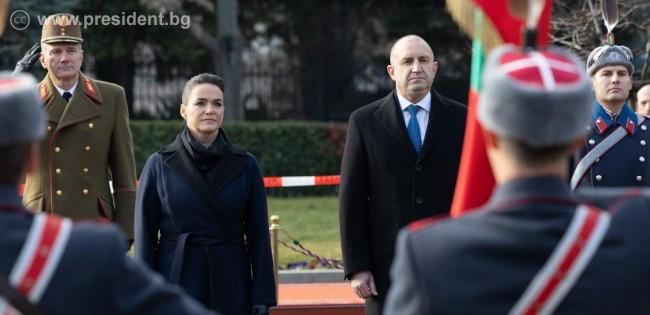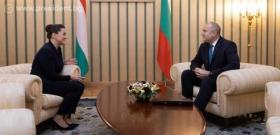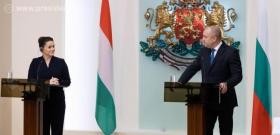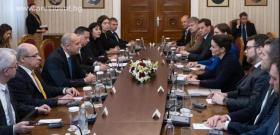NEWS
 2 February 2023 | 15:21
2 February 2023 | 15:21
Bulgaria and Hungary Expect Greater European Solidarity and Support for Strengthening the Protection of EU's External Borders and Tackling Illegal Migration
Supporting young families and promoting fertility as a targeted state policy were discussed by Presidents Radev and Novak
Tackling illegal migration and strengthening the protection of the EU's external borders is the duty and responsibility of all EU countries and requires more solidarity and fairness. This position was shared by the Presidents of Bulgaria and Hungary, Rumen Radev and Katalin Novak, who today held a one-to-one session and plenary talks in Sofia. Novak is in Bulgaria on an official visit at the invitation of the Bulgarian head of State, who earlier in the day welcomed her with a ceremony at St Alexander Nevsky square.
In statements to the media in the Coat of Arms Hall at the Presidency, the two highlighted the friendly relations between Bulgaria and Hungary, as well as the partnership between the two countries within the EU and NATO, based on common priorities and values. The growing challenges on the regional, European and international agenda require us to bolster our cooperation and develop it, Radev said.
The two presidents underlined that tackling illegal migration is an important part of cooperation and ensuring the EU's security. During the plenary talks, Radev and Novak highlighted the bludgeoning migration pressure and the efforts that the two countries, as frontline states, are making to protect the EU border. They agreed that the situation requires decisive action and more support from the European Commission. Joint and swift solutions are needed from the EU, Novak said during the press conference.
Responding to a journalist question, Radev pointed to the significant resources invested by the budget in protecting the EU's external borders, as well as the people and equipment involved. Bulgaria has already sent to the European Commission the necessary financial estimates for improving the protection of the Bulgarian border, the President said, adding that the EC does not accept for the time being proposals for building solid deterrence facilities and is ready to help with investment in various technical surveillance means. The President added, however, that the issue does not only concern the technical provision, but also the regulation, as a change of approach and European policy on the registration of illegal migration is needed. We are against the tendency for Bulgaria and the frontline countries to become buffer zones, as camps for illegal migration, President Radev said.
The head of State thanked for the consistent support for Bulgaria and Romania's membership in the Schengen area. At a time of crisis, blocking our accession to Schengen means economic losses not only for our two countries, but also for the entire EU, the President said. Bulgaria should be a member of the Schengen area as soon as possible, Novak said and also highlighted the interest of all EU citizens in this decision.
The two presidents discussed the consequences of the war in Ukraine and the continuation of the conflict and called for a lasting peace. Both sides are following with alarm the invasion in the context of both the security and the rights of the Bulgarian and Hungarian communities on Ukrainian territory. The escalation of the conflict threatens the security of the whole of Europe, turning into a war of attrition not only for the warring parties, but also for the European economies and social systems, President Radev said, stressing that the solution will not come by giving more weapons, but with more will for dialogue and diplomatic efforts for the de-escalation and cessation of hostilities.
The two presidents stressed the importance of partnership in the energy sector to achieve diversification and ensure security and reliability of energy sources and routes. Radev highlighted Bulgaria's active policy of connecting the gas systems with the neighbouring countries, which also brings benefits to Hungary. The aggregation of orders for liquefied gas and joint participation in international markets through joint tenders leads to a reduction in prices, the Bulgarian President said, pointing out that this approach is already yielding positive results for this economy. Radev highlighted the importance of the Vertical Gas Corridor and expressed appreciation for Hungary's support for the Solidarity Ring (STRING) project initiated by Bulgaria, which allows the transmission of additional quantities of natural gas to Europe from the Southern Gas Corridor, using the existing infrastructure of several European countries. The development of nuclear energy was also a topic of discussion.
The Hungarian model of state policy to support young families and raise the birth rate was also in the focus of the meeting between Rumen Radev and Novák. The Bulgarian President highlighted the effectiveness of the incentives applied by Hungary to tackle the demographic crisis. During the plenary talks, which were attended by Deputy Prime Minister and caretaker Minister of Labour and Social Policy, Lazar Lazarov, the possibilities of sharing the Hungarian experience in this field were discussed. In the last 10 years, state support to young families has doubled in Hungary, with the country recording the highest growth in the EU in terms of total fertility rate, Rumen Radev stressed.
Bulgaria and Hungary will keep on developing the traditionally good cultural and educational ties. President Radev expressed gratitude for the Hungarian state's support in preserving the language and national identity of the Bulgarian community in Hungary. This is an example of true European behaviour and tolerance, which is important to note against the backdrop of growing hatred and persecution of Bulgarians in a neighbouring country, Rumen Radev specified.
The Bulgarian President pointed out that Hungary is an important economic partner of this country and is among the leading foreign investors here, as well as the growing trade and economic exchange. In 2021, bilateral trade amounted to EUR 2.073 billion, marking an increase of almost 23 percent, and by October of last year there was an increase of almost 30 percent compared to 2021. Apart from the sectors of tourism, investment and banking, there is a growing potential of developing cooperation with Hungary in deepening ties between our industrial and economic zones and technology parks, as well as in the joint development of leading innovative and research projects, President Rumen Radev further said.
MORE FROM NEWS
14 February 2026 | 14:11
 President Iotova Discussed the Growing Hate Speech and the Retreat from Human Rights with the CEO of the American Jewish Committee, Theodore Deutch
President Iotova Discussed the Growing Hate Speech and the Retreat from Human Rights with the CEO of the American Jewish Committee, Theodore Deutch
 President Iotova Discussed the Growing Hate Speech and the Retreat from Human Rights with the CEO of the American Jewish Committee, Theodore Deutch
President Iotova Discussed the Growing Hate Speech and the Retreat from Human Rights with the CEO of the American Jewish Committee, Theodore Deutch
0
2
14 February 2026 | 13:50
 President Iliana Iotova Met with Croatian Prime Minister Andrej Plenkovic
President Iliana Iotova Met with Croatian Prime Minister Andrej Plenkovic
 President Iliana Iotova Met with Croatian Prime Minister Andrej Plenkovic
President Iliana Iotova Met with Croatian Prime Minister Andrej Plenkovic
0
2
14 February 2026 | 11:21
 Presidents Iliana Iotova and Ilham Aliyev Discuss Energy Cooperation between Bulgaria and Azerbaijan
Presidents Iliana Iotova and Ilham Aliyev Discuss Energy Cooperation between Bulgaria and Azerbaijan
 Presidents Iliana Iotova and Ilham Aliyev Discuss Energy Cooperation between Bulgaria and Azerbaijan
Presidents Iliana Iotova and Ilham Aliyev Discuss Energy Cooperation between Bulgaria and Azerbaijan
0
1
13 February 2026 | 20:32
 The President: The Inclusion of Bulgarians in the Constitution of the Republic of North Macedonia Is an Indispensable Condition for Its EU Membership
The President: The Inclusion of Bulgarians in the Constitution of the Republic of North Macedonia Is an Indispensable Condition for Its EU Membership
 The President: The Inclusion of Bulgarians in the Constitution of the Republic of North Macedonia Is an Indispensable Condition for Its EU Membership
The President: The Inclusion of Bulgarians in the Constitution of the Republic of North Macedonia Is an Indispensable Condition for Its EU Membership
0
2
13 February 2026 | 20:31
 The Head of State: Europe Has Realised That It Is Time to Take Its Destiny into Its Own Hands
The Head of State: Europe Has Realised That It Is Time to Take Its Destiny into Its Own Hands
 The Head of State: Europe Has Realised That It Is Time to Take Its Destiny into Its Own Hands
The Head of State: Europe Has Realised That It Is Time to Take Its Destiny into Its Own Hands
0
2
12 February 2026 | 12:02
 President Iotova: The Urgent Resolution of the Problems Facing Bulgaria Depends on the Shared Responsibility between the Caretaker Cabinet and the National Assembly
President Iotova: The Urgent Resolution of the Problems Facing Bulgaria Depends on the Shared Responsibility between the Caretaker Cabinet and the National Assembly
 President Iotova: The Urgent Resolution of the Problems Facing Bulgaria Depends on the Shared Responsibility between the Caretaker Cabinet and the National Assembly
President Iotova: The Urgent Resolution of the Problems Facing Bulgaria Depends on the Shared Responsibility between the Caretaker Cabinet and the National Assembly
0
3
23 January 2026 | 17:03
 Rumen Radev: Like All Bulgarians, I believe that with Joint Efforts We Can Change Bulgaria
Rumen Radev: Like All Bulgarians, I believe that with Joint Efforts We Can Change Bulgaria
 Rumen Radev: Like All Bulgarians, I believe that with Joint Efforts We Can Change Bulgaria
Rumen Radev: Like All Bulgarians, I believe that with Joint Efforts We Can Change Bulgaria
0
3








 2026
2026